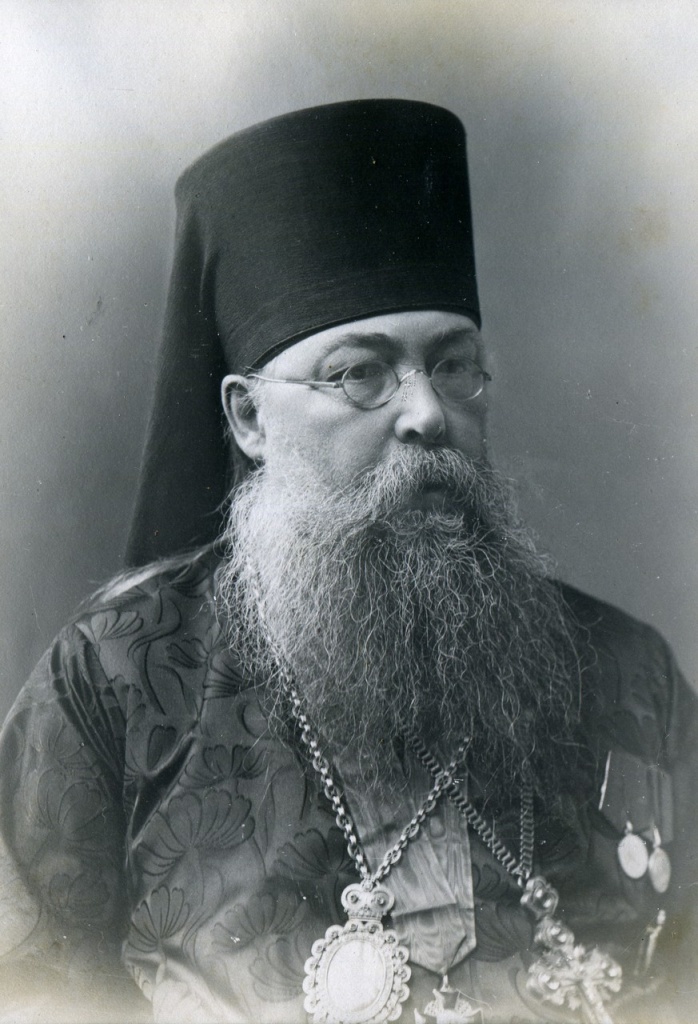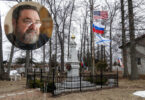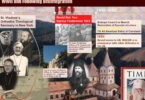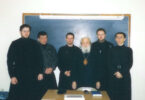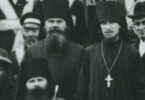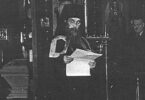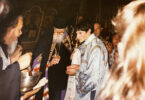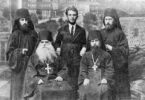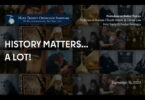From Editor
The future Bishop Mikhail was born in 1858 into a clergy family. Not much information about him survives. In 1884, he graduated from Saint Petersburg Theological Academy. The future bishop Mikhail was ordained priest. In 1910, he was tonsured a monk and elevated to the rank of archimandrite. On May 25, 1911, Archimandrite Mikhail was consecrated the first bishop of the newly founded Alexandrovsk Vicariate of the Diocese of Stavropol.
In 1917, Bishop Mikhail, like many other clergymen of the Russian Church, greeted the February Revolution enthusiastically. In his 1917 Paschal homily, he likened autocracy to “satanic chains” by which all life of the people of Russia had been fettered.
General Anton Denikin’s Volunteer Army controlled Stavropol in the Caucasus. In May of 1919, there was a council that organized all dioceses in the part of the South of Russia controlled by the Anti-Communists into a single district under a Supreme Ecclesiastical Authority of the South of Russia. I am sharing a translation of Bishop Mikhail’s speech at this council below.
I have previously written here that frontlines of the Civil War de facto already partitioned the Russian Church into the church inside and outside of Russia. The 1919 Council became an important milestone in shaping these different experiences.
By the time of the All-Diaspora Council of 1921, Bishop Mikhail was living in Grgeteg Monastery in Serbia. He died on this day in 1925. He participated in the Council and did not protest against the Council’s statement on the restoration of the Romanov dynasty. I wonder if this fact means that he became a monarchist.
Protodeacon Andrei Psarev,
September 22, 2023
Your Eminences, God-wise archpastors, Your Excellencies, Most Reverend Fathers and Brothers!
We are on the eve of a great historical day. 1594 years ago, on May 20, the First Ecumenical Council was opened in the city of Nicaea. I see special Divine Providence in the circumstance that now, on the day of the commemoration of the Fathers of the First Ecumenical Council, the Southern Russian Local Council is opening in the city of Stavropol. The idea of conciliarity, which defines the meaning and significance of convening archpastors, pastors, fathers and doctors of the Church from the entire inhabited earth (if possible, for Ecumenical Councils), and from the entire area determined by the borders of a given state (for Local ones), not only did not die, but, as you see, survived to the present day. Yea, this idea, moreover, could not die. On the contrary, it becomes all the more vital because life itself, expanding and developing in all directions of mental inquiry, religious awakening, moral reassessment, forms of statehood, social and public trends – life itself, I say, puts forward an urgent demand to resolve pressing needs and queries concerning religious, church, legal, everyday, parish, and any other way of life through the competence of conciliar representatives. It is such a conciliar competence that is required, since all these issues and needs exceed the competence of the local spiritual diocesan and supreme military or civil authorities. I dare, however, to surmise that from the previous speeches of the speakers, the necessity and expediency of convening the present Council has been made sufficiently clear.
You have been presented with the well-founded considerations and exhaustive motives for this convocation. These motives, dictated by life, are persuasive, and the considerations are no less convincing. And from here, we foresee that the Council that is now opening will lead us out of the impasse in which the Church and the entire flock find themselves in many aspects of church and public life, cut off as they are from Moscow, the heart of tormented Russia, and from His Holiness Patriarch Tikhon, the Primate of our Church. A head constrained in a vice and fading activity of the heart inevitably cause the limbs to atrophy. It is necessary by all means, at least temporarily, to support and develop life on the peripheries. And one of these peripheries, the distant outskirts of what was so recently boundlessly great Russia, is the whole of the North Caucasus. We pray to God that these peripheries will reduce the radii of their distance from the center as soon as possible. We pray to God that the disparate parts of one great body – the Russian state – will soon be reunited. We pray to God that the Council that is being opened now, out by necessity, will be only a temporary phenomenon and, better yet, a short-lived one, and that in the near future, it will resign its powers and transfer them to its elder brother: the All-Russian Local Council in Moscow. But God’s ways are inscrutable, and God alone knows how much longer we will have to be cut off from the rest of Russia and its center. And life… life does not wait, it puts forward its queries, makes demands and waits for their solution. Therefore, we bow low before those who, taking these demands into account, had the idea of establishing at least a temporary Local Church Council.
We, the residents of Stavropol, are sincerely and deeply grateful to the conveners of this Council, and we greet with fraternal love all its representatives who have gathered here. And all the more sincerely, all the more ardently, we would like to testify here to the fact that we are proud, and consider ourselves fortunate, that the Cathedral is taking place here in Stavropol.
We have something to be proud of. Throughout the entire territory occupied by the valiant troops of the Volunteer Army, Stavropol province was the first in Russia to be liberated from the Bolshevik yoke. It enthusiastically greeted the bearers of law and order and recognized the authority of the Commander-in-Chief of the Volunteer Army. At one time, when Soviet Councils of Deputies were planted here, there, and everywhere, an unimpeded self-reliance was put on display. Stavropol was one with Russia, that old Russia where law and justice remained inviolable, where norms, order and structures rested on the old tried and tested, proven principles of statehood and were sanctified by the commandments of the Lord. We, the residents of Stavropol, were proud that, having survived oppression, depredation and murder at the hands of those new vandals for whom there is no law – neither Divine, nor human, nor the law of their own conscience – we nevertheless remained faithful to the state system that is being shaped under the slogans of the Volunteer Army, reconstituting a united, indivisible, great Russia and guiding the people toward the Constituent Assembly. This may seem like a paradox, but Stavropol at one time could say: “Russia is who I am.”
So, where should the first Local Southern Russian Church Council be, if not in the first city of the newly created Russia? And we are happy that our city now, on the day of the commemoration of the fathers of the First Ecumenical Council, albeit on a small scale, is seeing a repetition of the Councils of Nicaea in 325 and Moscow in the latter years. We are happy that our city, cared for pastorally by the senior hierarch among all those in the territory occupied by the Volunteer Army [Archbishop Agafodor Preobrazhenskii, +1919], was given primacy of honor. You all gathered here before him at his first summons, and he, under whose wise leadership all our spiritual administrative, educational and charitable institutions have operated for 25–26 years, has now greeted you on his own behalf in opening the Council.
And I, his humble novice and closest collaborator, take up the courage to greet you on behalf of these very institutions: the Diocesan Council, Theological Seminary, Theological School, Diocesan Women’s School, Educational Board, Missionary Board and others . Each of these institutions looks with hope at the present Council, and each member of these institutions welcomes each of you with open arms and proclaims: “Blessed is he that cometh in the name of the Lord!” Welcome, everyone!
Relevent Links:
Yulia A. Biriukova, “The Influence of Political Forces on the Activity of the Southwestern Church Council and the First Russian All-Diaspora Church Council (1919-1921)” Historical Studies of the Russian Church Abroad.
Michael Woerl, “Bishop Mikhail (Kosmodamiansky, d. September 1925) of the Caucasus and Stavropol” Historical Studies of the Russian Church Abroad.

